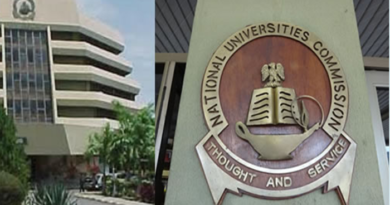Defunct Skye Bank management, directors under investigation – NDIC
The management and directors of the defunct Skye Bank Plc are under investigation by both the Central Bank of Nigeria (CBN) and the Nigeria Deposit Insurance Corporation (NDIC).
The managing director of NDIC, Umaru Ibrahim, in Abuja on Monday said the two financial sector regulatory authorities were monitoring closely the investigations by law enforcement agencies against the bank officials to determine their culpability in the failure of the bank.
On September 21, the CBN and NDIC announced the revocation of the operating license of the bank and the establishment of a bridge bank, Polaris Bank, to take over its asset and liabilities.
CBN governor, Godwin Emefiele, said in consultation with the NDIC MD, Mr Ibrahim, the apex bank decided the Asset Management Company of Nigeria (AMCON) would capitalise the bridge bank and begin the process of sourcing investors to buy out AMCON.
However, Mr Emefiele had said members of the board and management of the defunct bank would be retained given their “good performance”, while all its employees would be absorbed by Polaris Bank under a new contracts.
But the NDIC MD said at the opening of the Corporation’s 2018 Sensitisation seminar for Federal High Court Judges in Abuja, the officials of the defunct bank are currently under investigation by the relevant security agencies.
“NDIC’s Risk Assessment and Forensic Investigation Reports revealed the erstwhile management of the failed Skye Bank Plc. contributed to its failure by engaging in insider abuse, poor corporate governance and banking malpractices,” Mr Ibrahim said.
He said the reports identified various malpractices perpetrated by the directors, including fraudulent false accounting, manipulation of accounting records to present false profits and ratios, unlawful loan and credit facilities, non-disclosure of directors’ interests and lending beyond the single obligor limit.
The NDIC boss said the decision to adopt the bridge bank resolution option by establishing Polaris Bank Limited to take over the asset and liabilities of the defunct Skye Bank Plc resulted in depositors’ unhindered access to their funds.
Besides, he said, the option hepled the continuity of the operations of about 300 branches of the bank and the preservation of over 6,000 jobs.
In 2016, Skye Bank came under the radar of the CBN after it discovered some “unacceptable corporate governance lapses.”
The bank’s persistent failure to meet minimum thresholds in critical prudential and adequacy ratios culminated in its permanent presence at the CBN Lending Window.
On July 4, 2016, the CBN took a regulatory action on the bank, leading to the resignation of its chairman, all non-executive directors on the board as well as the managing director, deputy managing director, and the two longest-serving executive directors on the management team.
On other activities of the corporation, Mr Ibrahim informed participants the NDIC has commenced payment of insured deposits to depositors of the 153 microfinance and six primary mortgage banks whose licenses were recently revoked by the CBN.
The corporation, he said, performed this statutory mandate by its appointment as liquidator through a winding up order granted by the Federal High Court.
He described the collaboration between NDIC and the judiciary as a valuable engagement towards the development of the country’s financial system and the effective implementation of the corporation’s mandate.
The seminar for Federal High Court judges with the theme “Challenges to Deposit Insurance Law and Practice in Nigeria” was to address topical issues in bank supervision.
These issues include the regulatory framework of systematically important banks, the robustness of the legal system to facilitate criminal prosecution of bank directors and debt recovery under the Failed Banks Act.
The Chief Judge of the Federal High Court, Abdul Kafarati, commended the NDIC for its continued interactions with the Federal High Court through the sensitisation seminars.
Mr Kafarati said the impact of the seminars has deepened their understanding of the implications of the mandate and activities of the corporation, leading to more proactive and accurate adjudication of cases brought before the courts.
He expressed optimism that the broadening of the scope to include topical issues would further deepen the impact of the seminar towards addressing current regulatory issues in the financial system and the dispensation of more informed judgments.
Credit: Premium Times.




